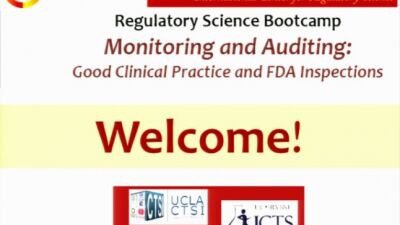- Regulatory landscape across the drug development process
- Drug development begins to be FDA-regulated during preclinical studies
- Good Laboratory Practices (GLP), Good Manufacturing Practices (GMP), and Good Clinical Practices (GCP) regulations must be followed during certain stages during drug development
- Repercussions of not adhering to good clinical practices
- Warning letters are sent to persons in clinical research for not following GCPs
- Define Good Clinical Practice (GCP)
- GCP is a standard for the design, conduct, performance, monitoring, auditing, recording, analysis and reporting of clinical trials or studies
- GCP compliance provides public assurance that the rights, safety and well-being of human subjects in research are protected
- GCP Goals
- To protect the rights, safety, and welfare of humans participating in research
- To assure the quality, reliability and integrity of data collected
- To provide standards and guidelines for the conduct of clinical research
- Good Clinical Practice = Ethics + Quality Data
- (Brief) History of GCP
- Foundations of the ethical conduct of clinical research come from:
- The Nuremburg Code (1947)
- The Declaration of Helsinki (1964)
- The Belmont Report (1979)
- International Conference on Harmonization (ICH-GCP, 1997)
- International Standards Organization 14155
- Code of Federal Regulations
- Foundations of the ethical conduct of clinical research come from:
- ICH E6- GCP
- The goal of ICH is to harmonize technical procedures and standards; improve quality; and improve time to market
- FDA adopted ICH GCP Guidelines in 1997
- FDA Regulations as they relate to GCP
- 21 CFR 11 — Electronic Records & Signatures
- 21 CFR 50 — Protection of Human Subjects
- 21 CFR 54 — Financial Disclosure
- 21 CFR 56 — Institutional Review Boards
- 21 CFR 312 — Investigational New Drugs
- 21 CFR 812 — Investigational Device Exemptions
- 21 CFR 814 — Premarket Approval of Medical Devices
- FDA Biomonitoring Research Program (BIMO) GCP Inspections
- BIMO encompasses all FDA-regulated clinical trials, which are those related to human drugs and biological drug products, devices, foods, and veterinary medicine
- BIMO goals are (1) to protect the rights, safety, and welfare of subjects involved in FDA-regulated clinical trials; (2) to determine the accuracy and reliability of clinical trial data submitted to the FDA in support of research or marketing applications; and (3) to assess compliance with FDA’s regulations governing the conduct of clinical trials, including those for informed consent and ethical review
- BIMO is an on-site inspection by The Office of Regulatory Affairs for compliance, subject protection and data verification
Regulatory Science Symposium: Monitoring and Auditing Session 1: Introduction to Monitoring, Auditing, and FDA Inspections & GCP (2016)
In this series, we will discuss regulatory complexities regarding clinical trials.
Chair and Associate Professor of Regulatory and Quality Sciences Associate Director, D. K. Kim International Center for Regulatory Science
Assistant Professor, USC Mann Dept. of Regulatory and Quality Sciences; Associate Director, Regulatory Knowledge and Support
Course Syllabus/Topics
Acknowledgement
Accompanying text created by Amelia Spinrad | Regulatory Knowledge Support Specialist | spinrad@usc.edu


